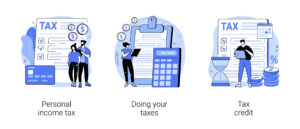Things to Consider for Your 2015 Capital Gains Tax
There are all kinds of investors in the world. Some are looking to make a quick buck by buying and then quickly selling stocks as soon as they increase in value. Other investors buy stocks with an eye toward the future, which means they are in it for the long haul.
In any case, anyone who invests wants to be successful at it. It’s a great feeling to buy stock in a company and see that stock increase in value. However, at some point if you plan on selling that stock and cashing in or your gains, you will have to give a portion of those gains to the taxman. What percentage you will owe will depend on the size of your gain and how long you have owned the stock.
The government wants investors to hold onto their stocks longer. To encourage this they have a lower tax percentage on stocks held longer than a year. Whether you’re a quick turnaround trader or a long-term investor here’s what you should be aware of in 2015 for your capital gains taxes.
First, generally all you need to know to determine your capital gains is the difference between what you paid for the stock and how much you sold it for. When you know that amount then you can calculate the tax. Your tax rate will depend on which bracket you’re in. There are three that apply:
- If your ordinary income puts you in the 10-15 percent tax bracket, then your long-term capital gains rate is 0 percent.
- If your ordinary income falls in one of the 25, 28, 33, or 35 percent tax brackets then your long-term capital gains rate is 15 percent.
- If your ordinary income is in the 39.6% tax bracket, then your long-term capital gains rate is 20%.
There are a few other caveats to remember. For high-income earners, there is an additional 3.8 percent surtax on net investment income. Also, you only pay taxes on the net of your capital gains, which can make a big difference if you sell more than one stock in a year. If you want to learn more about capital gains taxes then please contact GROCO for more answers. Click here or call us at 1-877-CPA-2006.
Income the IRS Can’t Touch
Income the IRS Can’t Touch There’s one readily available and legal source of untaxed income that we know of: municipal bonds. These securities are issued by state and local governments, school districts, hospitals and other public agencies to support community projects and services. To permit these worthy endeavors to raise money economically, Uncle Sam exempts…
Avoiding Real Estate Tax Revaluations
Avoiding Real Estate Tax Revaluations by Steven Singer, CPA As a result of the passage of Proposition 13 almost thirty years ago, real estate owners currently enjoy paying property taxes based on the property’s purchase price, value of improvements and an annual increase of 2% over the previous years’ assessed value. As a result of…
Annuities in Qualified Retirement Plans
Annuities in Qualified Retirement Plans By Russell Hill Using annuities in qualified retirement plans. Qualified annuities reduce your current taxable salary in addition to accumulating tax deferred earnings, when you contribute money to an annuities program through an employer (as one of the investment options in a salary reduction retirement plan). Those who work for…
Paying Too Much In Taxes?
Paying Too Much In Taxes? By Theodore Lanzaro Now that the end of the year is near, it is time to review a few business tax tips for 2008. Anyone who owns a business or is planning to start a new business in 2008 should be thinking about maximizing the profitability of their business and…


